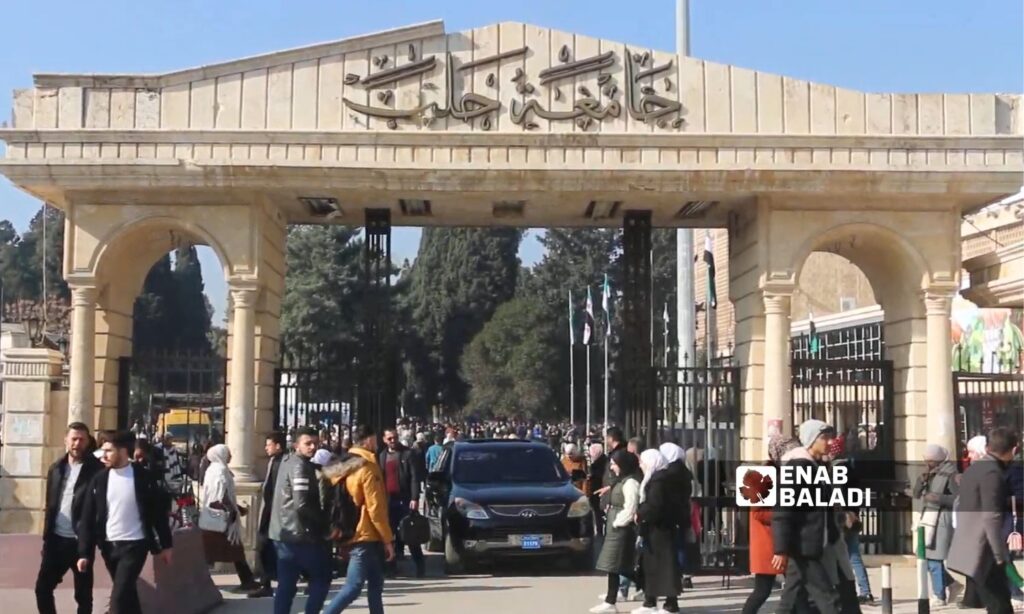Enab Baladi – Ghazal Sallat
The circumstances of asylum, security pursuits, and arrests have forced thousands of Syrian students away from their university classrooms, leaving behind suspended dreams. However, many refuse to let their stories remain unfinished, even if the last chapter is delayed.
Today, after more than a decade, some are returning to their studies after a long absence, seeking to continue their academic journey interrupted by years of seeking refuge, attempting to build a bridge between what they have experienced and what they aspire to achieve.
With every step they take in lectures and exams, these students face a complex reality shifting between their hope for a better tomorrow and the challenges posed by Syria’s transitional phase.
Seats awaiting
Syrian universities and educational institutions have witnessed a gradual return of students who were driven away by the previous Syrian regime since the outbreak of the Syrian revolution in 2011. Some resumed their studies immediately after returning to the country, while others submitted requests to their universities, waiting for the right opportunity to return to Syria and continue their education.
“I returned to my university and found the statue of Zuhair ibn Abi Sulma waiting for me, as everything in Aleppo awaits me,” described Shahad Baqi Zadah in a video clip on Instagram, capturing her moment of returning to the Faculty of Arts and Humanities at Aleppo University after being absent for years.
Baqi Zadah told Enab Baladi, “I was studying Arabic language and literature, and I had only three courses left to graduate. However, arrests and the complete control of the Assad regime over the city of Aleppo at that time forced me to leave university and seek refuge in Turkey.”
Meanwhile, Ammar Habib, a production manager at a food industry company, plans to return to settle in Syria and resume his studies after he submitted a request to continue his education at the Technical Agricultural Institute with a specialization in food industries.
Habib, who could not complete his studies after leaving Syria due to being wanted by security branches because of his support for the Syrian revolution, said, “I was one of the top students at the institute, and my goal was to join the college because I love my field very much and I hope to excel in it.”
He added, “The hope was always there, but I never imagined returning to my studies.”
For Khawla Bayrini, a student in the Faculty of Agricultural Engineering, her first thought upon hearing the decision allowing students to return to their previous enrollment was her dream, which she described as “almost fading away.”
Bayrini, who dropped out in her third year due to security pressures, said, “Despair crept into my heart many times, and I lost hope of completing my studies. However, after the fall of the regime and the issuance of the decision allowing dropout students to resume their studies, I found myself looking back at a past full of ambition and will.”
She added, “I decided to resume my studies despite knowing that the challenges have become greater and the difficulties increased; however, this was not just a fleeting idea or mere words spoken.”
The Ministry of Higher Education and Scientific Research issued a decision on December 26, 2024, allowing undergraduate and graduate students who had their studies interrupted since the revolution began in 2011 to apply to return to their previous enrollment in public and private universities.
Challenges of returning
After a long period of interruption, returning students face many challenges. While they try to readjust to university life, many of them bear an additional burden represented by their responsibilities as parents, making it difficult to balance studies and family obligations.
Moreover, being in lecture halls with younger classmates poses a psychological challenge that generates stress and anxiety.
Although the age gap can be difficult, many students contacted by Enab Baladi see it as a natural matter, and adapting to it is part of the journey back to university life.
Shahad Baqi Zadah believes that those who have interrupted their studies early on will face greater difficulties compared to students in her position, who have some remaining courses to graduate. She points out that the difficulty is not limited to the age difference between interrupted students and new arrivals, but rather to the ideological differences and the varying viewpoints among individuals.
She added, “I find myself needing more hours to study due to the change in my lifestyle, priorities, and responsibilities compared to those I had when I was a student several years ago.”
Maryam Rashid, who also has seven courses left to graduate from the Arabic language and literature department, faces difficulties in studying, as her interruption period has been long, as she states.
Regarding adaptation, Rashid said, “I felt a deep fear of society, the university, and the surrounding environment, especially because of the differing opinions among us. However, after taking the first exam, things changed a bit, and the situation improved a little.”
She continued, “Studying with younger students is not easy for me, but I have to adapt.”
Ammar Habib agrees with Rashid about the difficulties of studying with younger classmates and views adaptation as “a necessity.”
Academically, students face difficulties in adjusting to the new curricula, as some courses have changed, with some being removed and others newly added that they have not previously encountered.
In this context, Shahad Baqi Zadah said, “The Ottoman language course has been canceled, and I now have to choose between Persian or Hebrew, but I have no prior knowledge of either.”
As Syria continues to navigate a new transitional phase, the determination of students wishing to return to their previous university enrollment reflects the will of a generation striving to hold on to its dreams despite the challenges.
While the path to return is open for many, some remain trapped by obstacles hindering their return.

